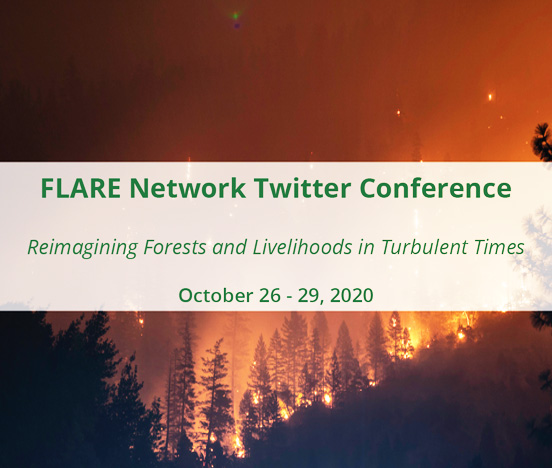Due to the COVID-19 pandemic, the 6th Annual FLARE Meeting was held as a Twitter conference online.
Plenary Presenters
Penny Davies
Kundan Kumar
Rights and Resources Initiative -RRI
Anne Larson
CIFOR
Click here to view the full Twitter Conference program
Twitter Conference: What it is it and how do I design an engaging presentation?
Based on the social media platform Twitter, a Twitter conference is an event where people can showcase their work to a broader audience. Presentations consist of a series of tweets (280 characters each). The event is free, and anyone with a twitter account can see your presentation! The FLARE Network Twitter Conference presentations will consist of five tweets in five minutes (one minute per post). Each presentation will be followed by a Q&A session with tweeted questions. Each presenter uses the hashtag #FLARETC20 and observers simply follow the hashtag to engage with conference presenters. Since the tweets and hashtag remain online, you can view the presentations at a later time. Read more about how to develop a Twitter presentation here:
Twitter Presentation Guidelines
FLARE Twitter Conference Theme
Reimagining Forests and Livelihoods in Turbulent Times”
Sub-themes
1. Anti-racism and environmental justice
2. Covid-19, infectious disease, and human health
3. Poverty/prosperity
4. Social transformations, forests, and livelihoods
5. Climate action
Abstract submission and guidelines
Abstract Guidelines
You may submit multiple abstracts. To ensure equity and diversity across presentations, however, we may request selection of one presentation only, where multiple abstracts are accepted.
Abstracts should be no more than 350 words and must follow the structure below to convey the most salient features of your work:
Open with a jargon-free sentence or two, providing a basic introduction to your work that is understandable to a broad audience (students, scholars, practitioners, policy-makers, donors, non-government organization representatives, grassroots organizations, etc.) interested in natural resource issues. It should clearly state the general problem (within the forests and livelihoods domain and focusing on a key meeting theme);
Two to three sentences that provide more detailed information about the situated/on-the-ground context and relevance of your work that can be understood by an audience from diverse disciplines, sectors, and geographies;
Two or three sentences summarizing the methodology, approach, and main findings (please use the phrase, “Our/My study finds,” or We/I show” or equivalent);
Two or three sentences explaining the scholarly significance and practical application (the “so what”) of the main findings and argument, especially as compared to what is already known;
One or two sentences that situate the results in a more general context, framed by the relevant meeting theme.
Organized Session Guidelines
FLARE also encourages the submission of pre-organized session panels. Session organizers are responsible for organizing and/or publicizing the proposed session, soliciting abstracts, and selecting the abstracts for submission to the FLARE call for abstracts. The session organizer must notify the session submitters of their decision to accept or decline the abstract within 5 days of the FLARE abstract deadline. This gives the declined submitters an opportunity to submit as an independent abstract, if not chosen for your organized session.
One session typically includes 4 oral presentations, but this can be flexible for the Twitter Conference
Sessions could focus on a single topic, be a collection of related topics, present a series of book critiques, etc. Other ideas are welcome.
Each session abstracts must have a session coordinator. The coordinator must be indicated by “Lastname_Panel” at the end the abstract text.
Each session abstract must be submitted as a “Session” abstract (not oral presentation)
Each session must have a fifth abstract, submitted by the organizer, which describes the overall focus of the panel and lists the last names of the four session contributors.
Session abstracts must also follow the main abstract guidelines above.
Key Dates
Sept 9 – Oct 8 Call for abstracts – closed
October 10 Decision notification – complete
October 14 Program released to participants
October 20 Program released to the public (and posted here)
Check out the IUFRO Webinar: Forests, Trees, and Poverty. Results from a Global Assessment and Research Paths Forward.

